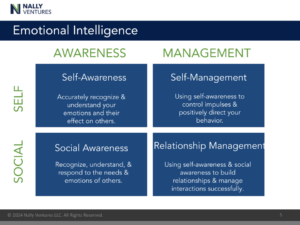
Less about selling; More about relationships
Sales success may be measured in numbers, but it depends on relationships.
If your job involves selling, your title may not include the word “sales” or “selling” at all. That’s likely on purpose.
Focusing on selling products or services is not a recipe for long-term sales success. Instead, focusing on fulfilling customers’ needs and wants and consistently bringing value to their table is how long-term, mutually productive relationships are developed and flourish.
What top salespeople have in common
What does it take to cultivate those types of relationships? Research by a USC business professor points to several characteristics of high-performing salespeople.
For example, they are humble and modest about their own role and instead promote their team’s abilities.
As you might expect, they are goal oriented and conscientious about their duties but not self-conscious, so are comfortable pushing to make contacts and sales.
Surprisingly, they are not gregarious, perhaps because being overly friendly with customers can make salespeople seem less authoritative and have less influence to steer customers toward a recommended solution.
What’s another common trait in sales success? Emotional intelligence!
Productive relationships require emotional intelligence
Emotional intelligence is both inward-facing and outward-facing. Inwardly, emotional intelligence (EI) refers to someone’s ability to be aware of, control, and express their emotions. Outwardly, EI refers to the ability to recognize and respect others’ emotions and handle interactions and relationships in a careful and empathetic way.
Why does EI matter in sales? A variety of research shows dramatically higher results for salespeople selected for their emotional intelligence. For example, at L’Oreal, high EI salespeople sold $91,370 more, for a net revenue increase of $2,558,360. And they had 63% lower first-year turnover.
This is a strength you can build! Psychologist Daniel Goleman’s widely used 4-quadrant model of emotional intelligence can be your guide.

How you relate to, understand, and control your own emotions and behavior is as important as how you relate to others. Here are some tips:
- Self-awareness is the ability to accurately perceive our emotions and stay aware of them as they happen. Improve self-awareness by making it a habit to notice and name how you’re feeling (angry, energized, sad, frustrated, elated, etc.). Another way to improve self-awareness is to ask for—and this is key—be genuinely open to peer feedback.
- Self-management is our ability to use our self-awareness skills to stay in control of our emotions rather than them controlling us. One way to self-manage is to pause rather than immediately reacting to stressful situations. Take a moment to stop and think about what to do next.
- Social awareness is our ability to accurately pick up on emotions in other people and to understand their needs. Increase social awareness by putting yourself in someone else’s shoes and paying attention to nonverbal cues. This requires temporarily setting aside your own feelings or needs.
- Relationship management is our ability to use both self-awareness and social awareness in order to manage interactions successfully. This is essential for selling!
- Ask and be genuinely curious about other people in their lives.
- Make it a habit to attend to others’ emotional needs as well as your own.
- Share what you know. Use sales encounters as a way to educate customers and build their knowledge.
- Don’t shy away from conflict, manage it! Take charge to settle disputes, differences of opinion, and misunderstandings.
- Be inspirational—create a vision for your customer that you believe they can achieve.
Because relationship-building is so essential to sales success, we won’t stop here. Stay tuned to learn more using consultative selling to build win-win relationships.
Does your sales team need a boost? Reach out to our Program Director, Jen Walls, to see how our custom sales training can help.
How can we help your leaders and business excel?
